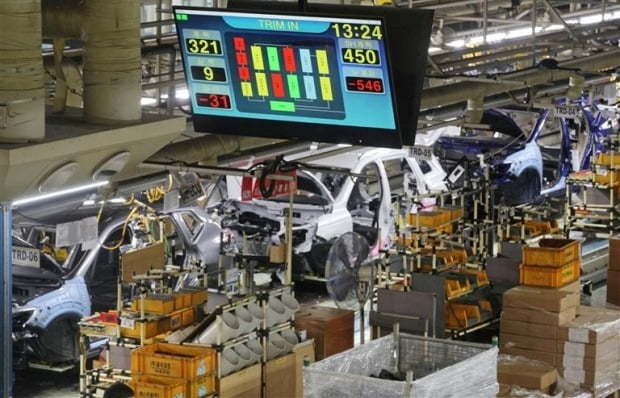 |
Renault Samsung Motors' factory in the southeastern port city of Busan. (Yonhap) |
South Korea recieved some of the lowest amount of foreign direct investment among 37 Organization for Economic Cooperation and Development members last year, a local think tank data showed Wednesday.
Asia’s fourth-largest economy’s FDI-to-gross ratio last year came to 0.32 percent, translating into No. 25 among 37 global economies in terms of FDI recipient, a report by Korea Economic Research Institute said.
The net FDI-to-GDP ratio -– which is FDI minus outward direct investment –- came to minus 74 percent, bringing it further down the rank to No. 28.
FDI refers to when a non-resident invests in the shares of a resident firm. ODI, on the other hand, refers to when a resident acquires securities or makes an initial investment in order to participate in the management of a foreign company. It also takes into account the establishment of subsidiaries or local offices.
Pointing towards the data, KERI called for an overhaul of current investment conditions and alleviation of strict rules to be cater towards the needs of foreign investors.
The nation’s FDI-to-GDP ratio has been hovering around the bottom of the ranks –- from No. 25 to No. 36 –- from 2005 to 2020, according to KERI. The ODI-to-GDP ratio, meanwhile, soared to No. 12 last year from No. 27 in 2005.
The improvement in the ODI ratio is due to the local firms’ expansion of overseas businesses throughout the period, according to the think tank.
The net FDI ratio remained in the No. 22 to No. 33 range in the 15-year period.
The figures indicate that while the flow of foreign direct investment into Korea has been stagnate in the long-term period, the size of money that outflowed from the country steadily increased, KERI explained.
“Foreign direct investment is an important factor of economic growth,” KERI said.
“An overhaul of regulations and tax benefits should be implemented to actively lure foreign investors,” it added.
The size of FDI brought in by South Korea shed 11 percent on-year in 2020 due to the unprecedented COVID-19 pandemic, according to data released by the Ministry of Trade, Industry and Energy in January. The economy attracted $20.7 billion in inflows last year.
Lack of corporate tax benefits for foreign investment firms have worked as a barrier for those seeking to enter the Korean market.
Renault Samsung Motors Chief Financial Officer Christophe Boutet said that South Korea needs to reform its tax system for investors amid increased woes brought on by the coronavirus pandemic, in a forum hosted by Korea Automobile Manufacturers Association last month. He added that foreign manufacturers are having a hard time seeing the benefits of doing business here, citing Renault Samsung’s auto manufacturing cost in its Busan factory, which is 62 percent more expensive compared with the firm’s other factory in Spain.
China brought in FDI worth $163 billion last year, while the US saw an inflow of $134 billion in the cited period, the United Nations Conference on Trade and Development said last month.
By Jung Min-kyung (
mkjung@heraldcorp.com)








